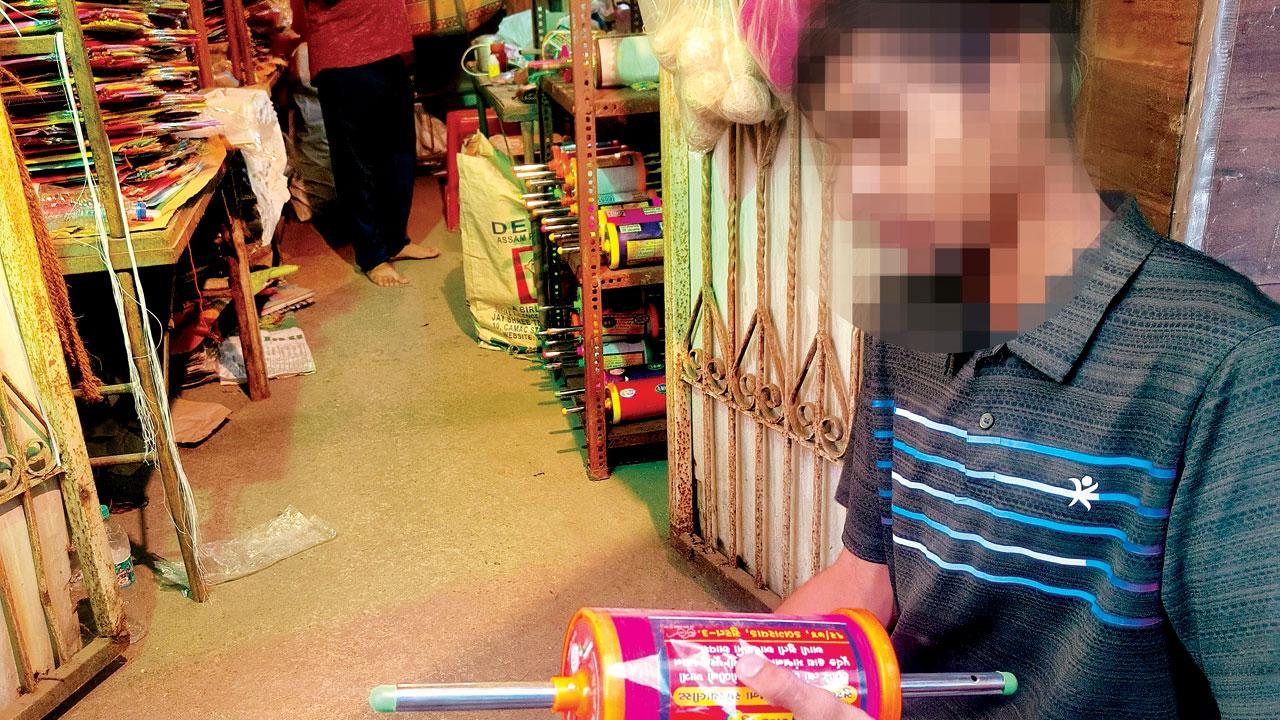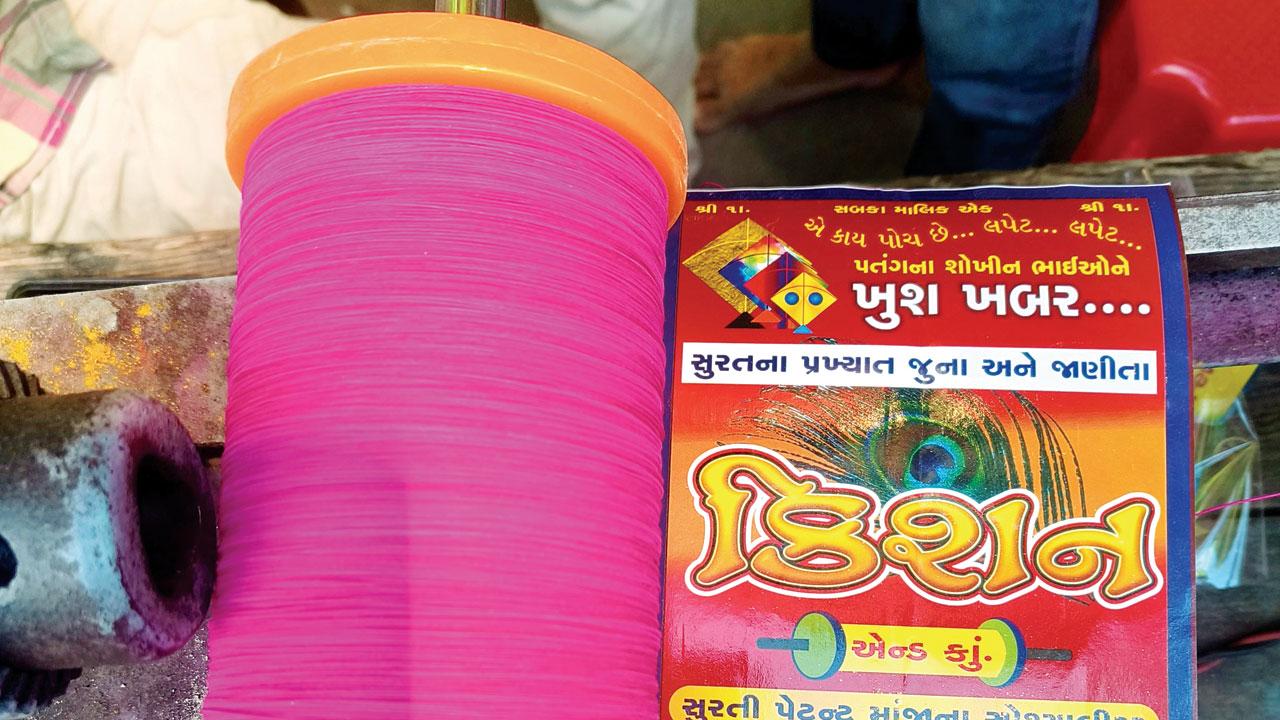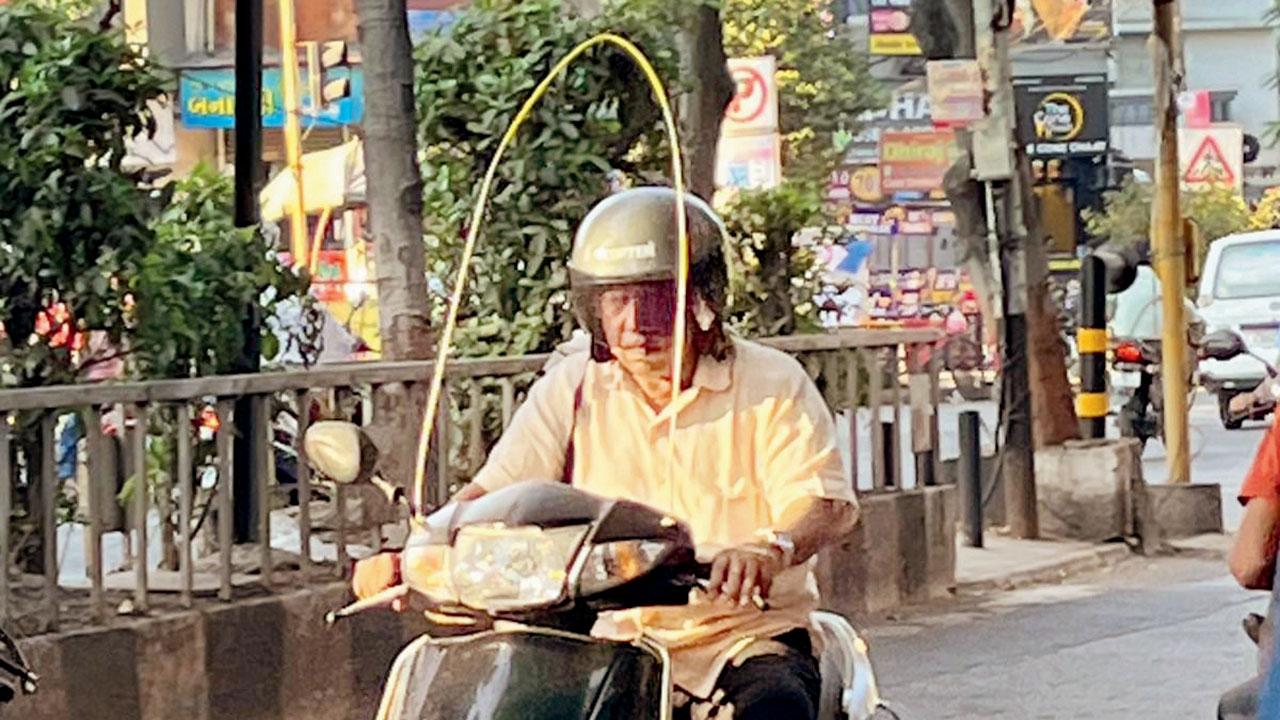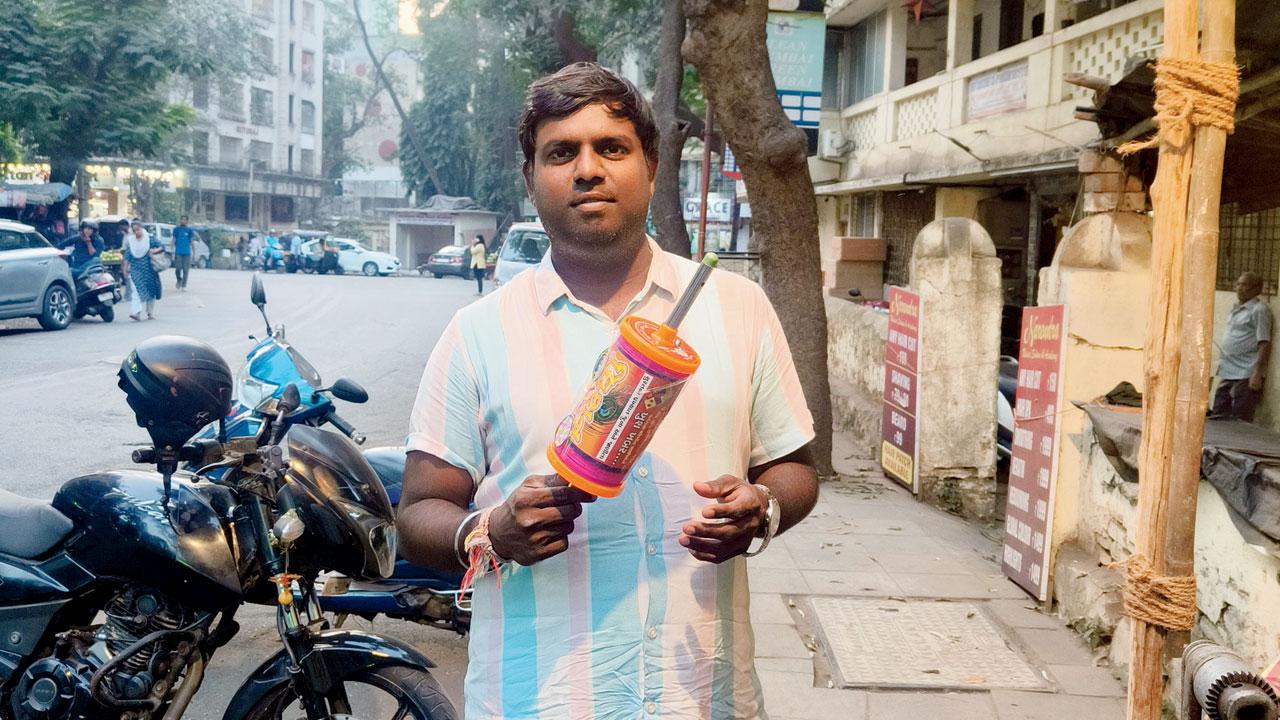As sellers seek to circumvent ban on deadly variants like nylon, experts say Bareilly-made glass coated thread is equally dangerous, on the back of constable’s death

Glass coated surti manja is still widely available. Pic/Rajesh Gupta
Key Highlights
- Mumbai police have intensified efforts to prevent the sale of banned Chinese nylon manja
- Several shops and wholesalers are selling these types of manja without any care
- Glass-coated manja, which can cause severe injuries, is openly available
With Makar Sankranti just weeks away, the Mumbai police have intensified efforts to prevent the sale of banned Chinese nylon manja and the equally dangerous glass-coated manja in the city following the tragic death of a police constable whose neck was slit by a manja. A reality check by mid-day, however, revealed that several shops and wholesalers are selling these types of manja without any care for police actions. Glass-coated manja, which can cause severe injuries or even fatalities, is openly available. Activists and lawyers say glass-coated manja has been banned, but shopkeepers insist that it is legal and they have no information regarding the ban.

Glass-coated manja
A fresh debate over the use of Chinese manja and glass-coated manja has started over the death of Mumbai police constable Sameer Jadhav, who was fatally injured on the Vakola bridge after his throat was slit by a manja. The police are yet to ascertain whether it was a Chinese manja or a glass-coated one. ”Any manja which has a coating of glass is banned and only cotton thread manja is allowed. We are drafting guidelines and soon the same will be issued,” a senior police officer said.
Reality check
mid-day's Faizan Khan and Shirish Vaktania investigated by visiting several shops in south Mumbai and the suburbs. They found that while Chinese manja is unavailable, glass-coated manja from UP's Bareilly is easily available, as it is “not currently banned” claimed shopkeepers. “Any glass-coated manja can cause severe harm if it comes into contact with birds or humans. I have so far rescued more than 10,000 birds in my life and most of the rescue calls my NGO gets are during Makar Sankranti. City police guidelines state that there is a ban on glass-coated manja as well,” said Sandeep Shah, an animal activist from south Mumbai who has been running an animal ambulance service through his NGO Reshmo Jeevdaya.

A biker in Surat seen with a protective frame attached to his bike
According to Shah, kite flyers prefer sharp manja and cotton manja is not sharp enough to cut the string of kites. This high demand for sharpness led to the popularity of Chinese manja. “We are currently checking for Chinese manja sellers, but have found none. We anticipate that as Makar Sankranti approaches, some shopkeepers may resort to selling it in the black market. The issue of glass-coated manja is crucial and the authorities should enforce guidelines more effectively,” Shah said.
mid-day reporter Faizan Khan visited the main manja market in Mumbai's Dongri area but couldn’t find any Chinese manja being sold. However, glass-coated manja, which is equally hazardous, is sold openly and shopkeepers insist it hasn’t been banned. “Customers seek Chinese manja for its sharpness, but we refrain from selling it due to the ban and recent incidents. Police checks are random. Glass-coated manja from Bareilly which is not banned has become popular due to the unavailability of Chinese manja. It poses risks of severe injuries if someone comes into contact with it,” a shopkeeper said.
Another shopkeeper in the area told the mid-day reporter that no one purchases the uncoated cotton manja. “The glass-coated manja has become popular but customers want Chinese nylon manja which can be made available during makar sankranti,” he said. mid-day reporter Shirish Vaktania visited the markets at Kalbadevi, Somvari Bazar (Malad), Kandivli and Borivali areas. A kite seller from Kandivli said, “The Chinese manja and nylon manja are banned but we are selling Indian manja which is glass-coated.
 mid-day’s Shirish Vaktania with glass-coated surti manja obtained from Malad. Pics/Rajesh Gupta
mid-day’s Shirish Vaktania with glass-coated surti manja obtained from Malad. Pics/Rajesh Gupta
This is not too sharp and it will not harm anyone. The cost of a firki and five rolls of string is around Rs 600. The Chinese manja rate is double and costs around Rs 1,000-Rs 1,200. This year Chinese manja is not available in the market as it is banned. But it is usually brought in from Gujarat.” Another shopkeeper from Kandivli said, “We are not selling Chinese and nylon manja at our shops. Surti manja is glass coated and is allowed by the government.”
Meanwhile, a shopkeeper from Borivli said, “Currently, we only have glass-coated manja available. When Makar Sankranti comes close many people start selling Chinese and nylon manja. Chinese manja is in high demand as it can easily cut the string of kites, but we are not selling it.” Another shopkeeper from the Kalbadevi said, “We are only selling Indian manja and surti manja which is glass-coated and sharp. Surti manja is allowed. We only advise that bikers take precautions during makar sankranti.”
Speaking with mid-day, Mitesh Rathod—an animal welfare representative of the Animal Welfare Board of India and a trustee of Karuna Trust, Virar—said, “This killer manja is killing birds and also affecting people. Every year we rescue more than 1,000 birds with the help of the fire brigade team. The majority of these calls come during Makar Sankranti. Glass-coated manja is also banned but shopkeepers continue to sell it openly in the market. The police need to take action,” he said.
Gujarat cops are also on alert
Meanwhile, the Gujarat police and municipal corporation are taking precautions to prevent injuries to bikers during Makar Sankranti. Surat in Gujarat sees the maximum number of kites being flown. The Gujrat traffic police have prohibited bikers on flyovers. Bikers also install an iron rod frame on the bike which prevents neck injuries. However, such measures haven’t been seen in Mumbai until now. NGOs have demanded that the police and civic body in Mumbai implement similar measures and prohibit bikers from plying on flyovers during Makar Sankranti season. The NGOs have also claimed that the civic body doesn’t remove manja hanging down from trees which can lead to serious injuries.
 Mitesh Rathod, animal welfare representative
Mitesh Rathod, animal welfare representative
A source from Gujarat police told mid-day, “Every year we prohibit bikers from plying on flyovers during makar sankranti season. We also fix a rope on each flyover a week before Makar Sankranti to prevent manja from falling directly on the flyover and ensure that it is above rider level. After the season, the civic body ensures that all majna hanging from trees, wires or any buildings is removed. This takes almost a week but results in many birds and people’s lives being saved.” The officer further stated that no sellers of Chinese manja were found in Surat this year.
Rathod has recommended that all bikers install frames on their bikes as it “will help save their neck from manja”. “Also, the civic body should ensure manja is cleared from trees, buildings and wires after the festival. This is being done in Gujarat and results in many lives being saved,” he said, adding that his NGO is requesting the government to prohibit bikers from riding on flyovers during the kite-flying season.
Satya Narayan Chaudhary, joint commissioner (law and order), Mumbai police, said, “Anything with a glass coating, including nylon manja, is deemed dangerous and hazardous, leading to its prohibition. We've initiated preventive measures and will soon release specific guidelines.”
Dec 24
Day police constable’s throat was slit
 Subscribe today by clicking the link and stay updated with the latest news!" Click here!
Subscribe today by clicking the link and stay updated with the latest news!" Click here!








